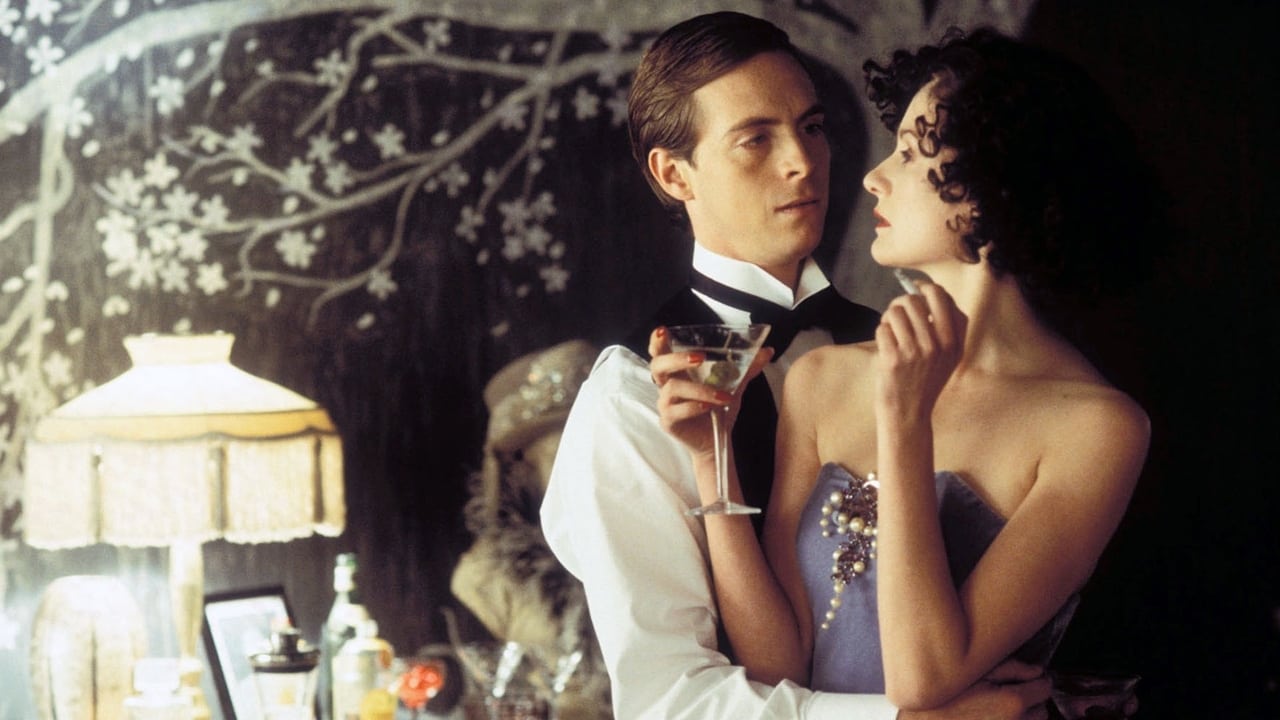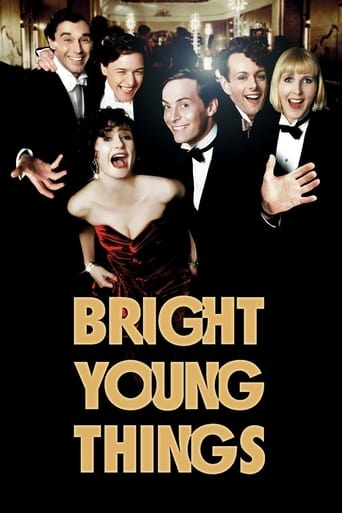ReaderKenka
Let's be realistic.
CrawlerChunky
In truth, there is barely enough story here to make a film.
Grimossfer
Clever and entertaining enough to recommend even to members of the 1%
Hadrina
The movie's neither hopeful in contrived ways, nor hopeless in different contrived ways. Somehow it manages to be wonderful
greenf74
I began to fear that this film would be a travesty of Waugh's superb novel when I saw Stephen Fry doing promotional interviews for it in which he claimed that the reason Waugh's title had been changed was because Waugh had actually wanted to call the book "Bright Young Things" but had been dissuaded by his publisher. Balderdash, of course. Obviously, some ill-read fellow in the film business had expressed the view that the title "Vile Bodies" suggested a horror film - perhaps about a depraved coroner? - rather than a sharp satirical comedy. Still, this annoyingly foolish pretence didn't quite prepare me to expect a film quite as awful as this one actually is. Fry seems to have no understanding of Waugh's novel at all, and even transposes it from the 1920s - the actual era of the "bright young things" - to the 1930s, when the absurdities of the rich, in an era of worldwide economic depression, were considerably less tolerated. The entirely fictitious and unspecified war which breaks out at the end of the book becomes World War II - even though Waugh's novel predates that conflict by nine years! Could it be that Fry didn't actually know this? The relentless cheapening of Waugh's fine satire is made worse by the employment of a large number of the best actors in Britain (not to mention Dan Aykroyd and Stockard Channing from America), most of whom are wasted - none more so than John Mills, in his last movie - and many of whom are encouraged by tyro director Fry to over-act irritatingly. Only Fenella Woolgar and David Tennant seem to have actually read the novel, or anything else by Waugh. The novel is, after more than eighty years, still as sharp as a razor; this film seems as shallow, empty and stupid as its characters.
sandra small
The film Bright Young Things, adapted from Evelyne Waugh's acclaimed fable; Vile Bodies is manic in its pace. As such it is reminiscent of His Girl Friday (1940) with its legendary speed of comedy delivery. The difference with His Girl Friday the speed of the comedy delivery is applied to loquaciousness with a bit of slap stick. Director Stephen Fry of Bright Young Things on the other hand utilises speed to articulate the decadence of the period. As such he is affective in his endeavour of making his point of a decadent aristocracy.The depressing aspect of the film is that the aristocracy are portrayed as decadent party animals, unlike the poor who in their pursuit of escaping their worries are (in today's post modern Britain) often labelled as 'feckless' by the tabloid press. But as the impoverished poor struggled to feed themselves across Europe during the inter-war period, the aristocracy idly carried on without social conscience or obligation to responsibility. Such decadence at the expense of the poor contributed towards the rise of extreme politics in Europe during the 1920s.Contributing to the masses' public perception of the idle rich decadence of the inter-war period was the tabloid press. The press baron in the film is shown as suppressing the realities of the issues affecting the ordinary people of Britain for profit, and thereby concealing truth.While Fry adeptly captures the decadence of the 20s in Bright Young Things, Peter O'Toole steels the film with his outstanding satirising of the stereotypical English eccentric. As the eccentric of the upper classes O'Toole's character Colnol Blout is the epitome of English two faced diplomacy of the ruling classes. The example being when he writes a cheque out for £1000 to help his prospective son-in-law to marry his daughter, when he signs it in the name of Charlie Chaplin. A typical English snub no less!Excellent film, well acted and brilliantly directed.
JoeytheBrit
Watching Stephen Fry making his directorial debut is a little bit like watching a toddler the first time he rides a bike without stabilisers. Things are dangerously wobbly to begin with then smooth out nicely as self-belief grows before everything comes crashing down due to over-confidence. Based on Evelyn Waugh's 'Vile Bodies', this film chronicles the debauched lifestyle of a group of paradoxically penniless rich kids (i.e. they're mostly lords and ladies but have no visible means of income) in a Britain of the 30s that would be unrecognisable to all but the impoverished aristocracy. This is a rarefied world that no doubt existed and seemed real to the likes of Waugh but which is unrecognisable to the majority of British people. Without doubt, however, this movie, in its representation of that period and lifestyle, provides us with an absorbing and entertaining tale.Apart from our hero Adam Fenwick-Symes (Stephen Campbell Moore, another débutant giving a good account of himself) the characters in this film aren't so much introduced as wander in like party guests you drunkenly met in another room ten minutes ago. They all share a propensity for decadence, and the affectation of declaring most everything to be a frantic bore, and are all, without exception, empty shells. We've seen it all before in the likes of Brideshead Revisited and The Sun Also Rises, but Fry manages to keep us hooked despite the clumsy manner in which he films those opening scenes. Perhaps it's because of the sumptuous production design that captures the feel of these bright young things' hedonistic lifestyle, or perhaps it's because of the amiably random manner in which Fry begins to pull the threads of his story together. Either way, despite Fry's apparent determination to use every scene transition known to the film world, and to make use of at least a little snippet from each of a multitude of cameras used to shoot many scenes, the story manages to hold your attention and drag you along with it, leaving you asking yourself why you're interested in a bunch of characters who are all about as deep as lemon peel.The story and the characters follow a predictable arc, but Fry fills the film with enough detail and ingenuity to at least keep us entertained. A host of famous faces provide a series of cameos that last little more than seconds in some cases – and this is without doubt the only film in which you will see the redoubtable Sir John Mills snorting cocaine. Fenella Woolgar outshines everybody in her scenes as the agreeably dippy cokehead Agatha, who brings a whole new meaning to the term 'powdering one's nose' and eventually parties herself into an insane asylum. In a role that strays into parody every now and then, she manages to provide a brief glimpse of a lost soul behind the party face, and her 'dream' speech pretty much sums up the entire social scene in which the characters are embroiled. James McAvoy, as the ill-fated Lord Balcairn (AKA Mr. Chatterbox) also stands out in one of few sympathetic roles.The film loses its momentum in the final act, when Fry moves from adapting Waugh's story to altering it completely, and we are left with an ending that is not only contrived but stretches credibility beyond its limits. Having managed to have steered a path that at least avoided conventionality in terms of plot, Fry suddenly makes a complete about-turn and presents us with a finale that stands out as a monumental piece of misjudgement. Perhaps Waugh's ending was too downbeat for the backers. It's a shame if that is the case, because it will mean that Fry most likely compromised himself. Somewhere down the line someone needs to show an ounce of integrity and fight for an ending that is true to the nature of the story, rather than compromising with a soap-opera climax that tarnishes the good work that has gone before.Bottom line: BRIGHT YOUNG THINGS is a worthy directorial debut from Stephen Fry and, while it's no classic, has a lot going for it. It's probably not worth seeking out, but if it happens to cross your path it's definitely worth watching. Just be sure to stop watching after the war scenes….
ncbrian
The best thing about Bright Young Things is the brilliant and fun atmosphere that's created. Writer/ Director Stephen Fry has established himself as a brilliant talent. His camera work and acting direction sets a perfect stage to seeing London in the 30's.The movie is adapted from the novel "Viles Bodies" that tells the story of a writer who reports the celebrity gossip to the local newspaper. The movie is filled with sex, scandal, and celebrity. The film brings London to life and makes you wish you were a part of this elite circle even from the opening credits. Unlike many movies, this movie's flaws will start you in the face while you watch them. The story doesn't fit together perfectly, which is usually the case when adapting classic literature. But in the end, I'm not sure you'll mind it. It's too gitty to focus on things like that.The film has two unforgettable attributes which I won't go into depth about or spoil. Just look for Stockard Channing.

